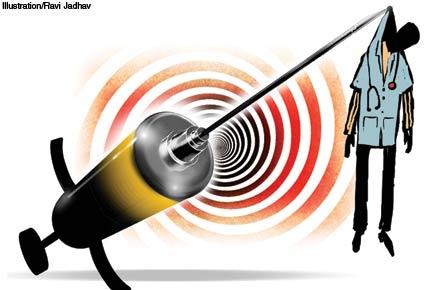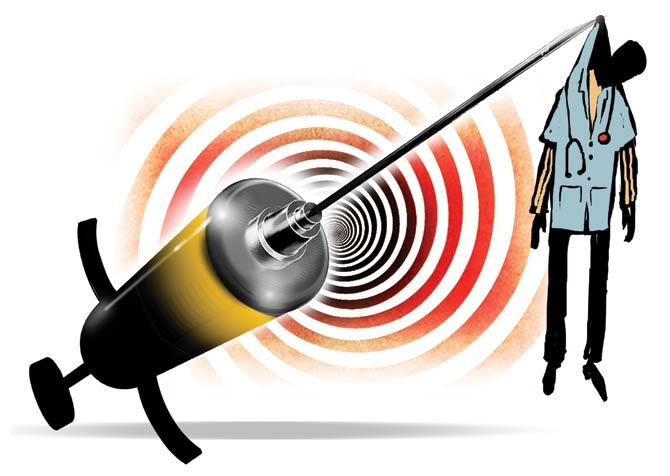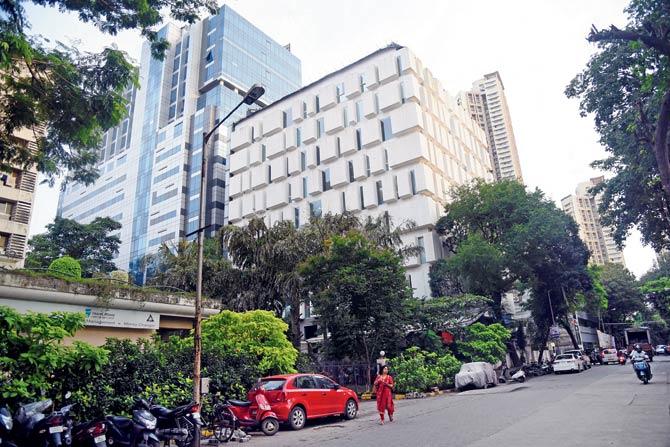The recent arrest of a nurse, caught with scheduled H drugs smuggled out of the hospital, has brought into the public eye the medical industry’s dark secret


Illustration/Ravi Jadhav
ADVERTISEMENT
The arrest of a nurse at Parel’s Global Hospital last month, after he was found trying to smuggle ampoules of a scheduled H drug out of the hospital, has blown the lid of the addiction to sedatives that’s prevalent in the corridors of city hospitals.

Global Hospital, Parel, is where the male nurse smuggled ampoules from
Verfen, the drug found on Baiju Joseph, an ICU nurse at the hospital, who was terminated, is a sedative and pain reliver that is largely used to provide relief to trauma and ICU patients. As a narcotic, it provides a high and rejuvenation to the person abusing it. Verfen is also a narcoleptic drug i.e. it is an anti-epilitic and, because of the Fentanyl Citrate content, a potent, synthetic opioid pain medication, it is extremely addictive.
A doctor from the hospital, on condition of anonymity, said that of the eight ampoules found on Joseph, seven were filled. Each ampoule contains 2 ml of the drug. Injections like Verfen are inexpensive as one ampoule costs Rs 63, so he could not have been taking them out to sell. But, they are not available across the counter without a prescription. At hospitals, these are available only with those in the ICU. If the male nurse was caught with such a large quantity, it has to be, in all probability, for self-consumption, as it is a potent sedative.”
Not just a Global malaise
Joseph’s case is the first to have been reported as he was eventually questioned before being taken to Bhoiwada police station where he was arrested under section 381 (theft by clerk or servant of property in possession of master or employer) of the IPC and later released on bail. However, those in the medical industry say abuse of drugs is rampant across several hospitals.
Dr Yusuf Merchant, a practising psychiatrist and president of Drug Abuse Information Rehabilitation and Research Centre at Fort, said, “Usually the staff, including doctors who get addicted to these drugs smuggle it into their quarters or homes, where they inject it into themselves for a high. The rampant misuse of medicines has been ongoing since the early 1990s, but the hospital administration has done little to curb it.”
Often, added Merchant, the administration doesn’t want to make the problem public because their reputation is at stake. "Global Hospital has set an example by registering an official FIR," he said.
It’s an emergency
Life in the hospital corridors isn’t easy. While the stipulated work shift extends for eight hours, it lengthens if the person meant to relieve a staffer doesn’t arrive or if there’s a mass disaster — fire, building cave-in, accidents etc — and the staff, right from nurses to doctors, have to work round the clock. Addiction to injections like fentanyl, morphine, morphine, pethidine and kathamine — sedatives used as pain relievers — are commonly abused.
Dr Merchant spoke of a female gynaecologist (name withheld), who got addicted to Pethidine. She would, he said, prescribe these to expectant mothers to reduce pain during labour. But, she started abusing the drug when she started suffering from pain in the abdomen. Before she could seek help, she died from an overdose.
According to Dr Merchant, “The problem is that hospital staff, including doctors, are bogged down by a hard routine, and are susceptible to sedative injections which, apart from giving a kick, also given them a feeling of well-being and freshness.”
A Global Hospital doctor requesting anonymity, said, “In the 1990s, a doctor at a south Mumbai hospital died after overdosing on an injection, similar to Verfen. It was never reported and the matter was downplayed as suicide.”
Dr Ketan Vagholkar, a practising surgeon at Thane’s Jupiter Hospital, said, it’s mostly the ICU staff that is vulnerable as they get direct access to such medication.
Dr Geeta Billa, a liver surgeon at Powai’s Hiranandani Hospital, said, “Pilferage of one or two ampoules is difficult to detect. Moreover, while it is the doctors who prescribe the injections, it is the nurse who usually gives the patient the injection. Whether the nurse has done so or not is hard to check.”
A senior anaesthetist working at a civic-run hospital said the injections are usually prescribed for patients in the ICUs, where they are on ventilator support. Here, entry to relatives is restricted and the staff has easy access to these injections. “They may make all relevant entries in the record books, but may either not administer the injection or may administer a reduced dosage if the same injection is prescribed to more than one patient. So, one ampoule can easily be kept for themselves and the empty ampoule returned for hospital records,” he said.
Dr Merchant said the best way to curb such incidents would be to conduct mandatory blood checks on the staff attached to the ICU or Operation Theatre. He suggested that records of the usage of such medicines be maintained and that they be administered only in the presence of either another nursing staff, or by allowing a patient’s relative to enter the ICU to supervise the administering.
Time for drug tests?
Dr Pravin Shingare, Director Medical Education and Research when contacted said, “There are ways and means by which the treating doctor can make out if the patient in the ICU has been administered the injection or not, and if not, then such staff moments can be kept under watch.”
Dr Shingare added, “These are Schedule H drugs and there are already many checks and records that are maintained as per the law. If such drugs are being smuggled out by the hospital staff, then even the hospital administration can come under the purview of inquiry.”
He suggested that ICU and OT staff be rotated frequently, so that they do not have access to consistent controlled drugs.
A doctor at Global Hospital said, “We can conduct random blood checks of our staff attached to the ICU and OT to check for drug use, but we cannot do it every month. Random blood checks themselves would act as a deterrent.”
To Dr Shingare’s suggestion, he said, “Usually, the staff at specialised ICUs require specific training and usually this staff is permanent at ICUs, unlike in the general ICU where a rota is possible.”
A senior FDA official, not wishing to be identified said, “Doctors and hospital staff are custodians of controlled medicines needed for treatment of patients, and if they start misusing such drugs themselves, it is a serious issue and in violation of existing norms. The FDA’s role is to ensure that patients do not suffer because of lack of medicines and, if these drugs are misused, the hospital administrations should take corrective measures.”
 Subscribe today by clicking the link and stay updated with the latest news!" Click here!
Subscribe today by clicking the link and stay updated with the latest news!" Click here!






